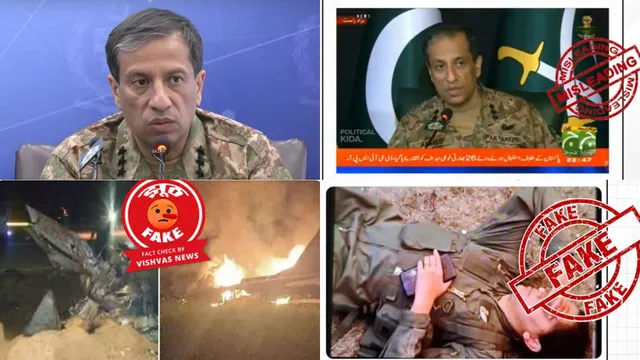- By Jatin Gandhi
- Tue, 13 May 2025 01:16 PM (IST)
- Source:JND
There is a cessation of military actions between India and Pakistan but experts warn that the ‘Disinformation War’ that Pakistan unleashed since the Pahalgam terrorist attack on April 22 only intensified with Operation Sindoor launched on May 7, and will not see a likely end anytime soon. Dr Umrao Singh, former Head of the Department of Defence and Strategic Studies at Punjabi University, Patiala, is a Defence Strategy expert who closely follows Indian security affairs and has supervised multiple PhDs by serving and former senior military officers. He speaks with Jagran and elucidates the nuances of the Disinformation War unleashed against India. Here are excerpts from the interview:
Q. Pakistan has been consistently using disinformation as a part of tactics. Pakistan’s DG ISPR last week claimed that India targeted the Sikh population in Punjab using ballistic missiles. The Pakistani Defence establishment’s motive seems to be to instigate Indian citizens against their own government. What is your understanding of this claim and the possible intent behind it?
Dr Singh: Deception is a part of the Pakistani military establishment’s arsenal not only when dealing with India but with its own people. The intent is to deflect attention from the fact that they now lag behind in military capabilities and are trying to fight through propaganda rather than military and strategic means.
Majority of the attacks that Pakistani forces launched before the ceasefire were on areas in Punjab. Amritsar and nearby areas have a very significant Hindu population with no segregation based on communities. Amritsar city has more Hindus than Sikhs. So it is quite foolish on part of the Pakistani propaganda machinery to claim this. We need to understand that one of India’s service chiefs is Sikh and a substantial number of our soldiers are Punjabis.
Q. Even by Pakistan’s disinformation warfare standards, this seems to be a new low. How far do you think they can go?
Dr Singh: The joint briefings by the MEA and MOD have systematically debunked claims made by Pakistan and provided evidence including of shelling of Gurudwaras by their troops. Pakistan’s efforts should have been be focussed on military means rather than discrediting Indian achievements and ability to hit back at critical military infrastructure deep inside Pakistan’s territory.
You need to understand the narrative is being built by the Pakistan Army that has played a dominant role in Pakistani politics since 1947. There are two reasons for that. Firstly, the Kashmir issue and secondly the fact that the Pakistan Army provide security to the Royal families of the Arab world for which they get remittances from the Emirates.
Pakistan Army chief General Asim Munir has been a vocal critic of India and is at the forefront of building this narrative. His speech in Islamabad days ahead of the Pahalgam terrorist attack underlined the two-nation theory. They use Islamist rhetoric and discourse to wage disinformation warfare against India while ignoring the basic needs of their people.
Q. How has disinformation warfare grown with the growth of the internet and social media? Is it the preferred means now to take on opponents in times of peace or limited military engagement like border skirmishes?
Dr Singh: Social media is easily affordable and accessible at a low cost and has given freedom to the common people to express their sentiments. But that does not mean that they understand matters. In any country where a large section of the population is unemployed they can easily get addicted to cheap internet and online content that can range from porn to emotional content and can ultimately lead to indoctrination. The disinformation strategy unleashed by Pakistan is designed with this in mind. Pakistan Army is one of the most corrupt armies in the world and they wage this disinformation war using terror outfits that are handled by the ISI. Poverty is a very crucial component in recruiting jihadists who may not even understand what Jihad is.
Q. How have Pakistan and China’s capabilities to wage psychological warfare deploying disinformation against India grown over the decades?
Dr Singh: In the context of China, hardly anyone in India understands Mandarin and we depend on mainstream English media to tell us what is going on in China. It is competing with the US and not India. China has investments in Pakistan and economic interests due to the CPEC (China-Pakistan Economic Corridor) and it is a well known fact that they are funding nine battalions of the Pakistan Army to guard the CPEC. It wants us to engage in hostility with Pakistan so it can focus on becoming a world power. They want military engagement between India and Pakistan but not a full-fledged war. China also has economic interests in India with the Beijing-based Asian Infrastructure Investment Bank (AIIB) funding projects in India worth 4.4 billion USD. India has invested 8.6 per cent of the total capital of the bank, which makes it the second largest investor in AIIB, after China.
For Pakistan, it is India-centric. The Islamic world doesn’t support Pakistan. After the Taliban took over Afghanistan, the conflict over the Durand Line has been reignited. Their own media is critical of them, so they need to fall back on disinformation warfare.
Q. What about our own capabilities to counter it?
Dr Singh: India has significantly upped its game to counter DW from Pakistan. From the time of the Kargil war, MEA and MOD began joint briefings on the military engagements between the two sides. MOD has been issuing media briefs and providing evidence of all counter-claims and successes. The Indian defence establishment has started actively rebutting Pakistani propaganda. There are establishments at multiple levels in the forces entrusted with countering Pakistan’s Disinformation Warfare.

